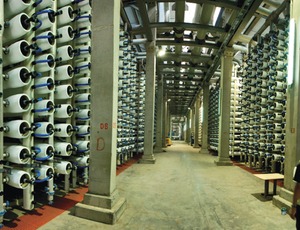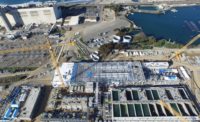
Seeking to enhance its prospects in the booming global water treatment and supply market unencumbered by its Israeli ownership, leading desalination technology firm IDE Technologies Ltd. is seeking a new foreign buyer.
Analysts speculate the firm could sell next year for as much as $1 billion.
The sale could help IDE, owned by two Israeli industrial firms, expand more rapidly abroad at a time when domestic prospects are plateauing.
The firm has been involved in the construction, operation and ownership of three large plants along Israel's Mediterranean coast over the past decade.
Along with two others in which IDE was not involved, including one set for completion next year at Ashdod, capacity in Israel is set to reach 600 million cu meters annually.
"The existing plants are expected to meet demand for the coming years, including commitments to the Palestinians and Jordan," says Avraham Tenne, director of desalination at Israel's Water Authority.
IDE already has developed large plants in China, India, Chile and Australia and the U.S.
Last year, it won the tender to provide technology for North America's largest such project—a $1-billion, 54-million-gallon-per-day seawater plant and pipeline in Carlsbad, Calif., that could be on line late next year.
The firm was in talks this year to build floating offshore plants in Japan, opened two offices in Australia and, last month, announced a partnership in Canada to expand oil-sands sector water treatment.
But the largest potential market remains the Arab world, currently off-limits for the Kadima, Israel, firm. "The global desalination market has been on a downturn, but the Arab world—in countries like Saudi Arabia, Qatar, Kuwait, Oman and the U.A.E.—still have a healthy pipeline of projects," says Tom Scotney, deputy editor at Global Water Intelligence, a leading water industry publication.
He says the best fit for IDE would be an owner such as Japan-based conglomerate Mitsui Group, "which has the financial clout and global reach as well as an established engineering base in the Middle East." But even if sold, it might still take up to five years or more before IDE sees business in the region, Scotney says.
With few prospects in Israel, IDE said it would lay off 50 of its 450 local employees. The firm reported net profit of $7 million on revenue of $112 million in the first half of 2014.
"There are only a few companies that have experience in the field of large desalination plants, and this could make IDE very attractive to a major international infrastructure firm," says Chen Herzog, chief economist and infrastructure expert at BDO Consulting, Tel Aviv.
To make IDE more attractive, its owners may sell its 50% stake in three Israeli projects—at Hadera, Ashkelon and Sorek—that are among the world's largest seawater reverse-osmosis facilities.
France's Veolia Environnement and Israel's Azrieli Group sold interests in two others to foreign and local equity funds. Israeli water-industry sources say IDE will likely do the same as desal plants are no longer viewed as risky investments.


Post a comment to this article
Report Abusive Comment